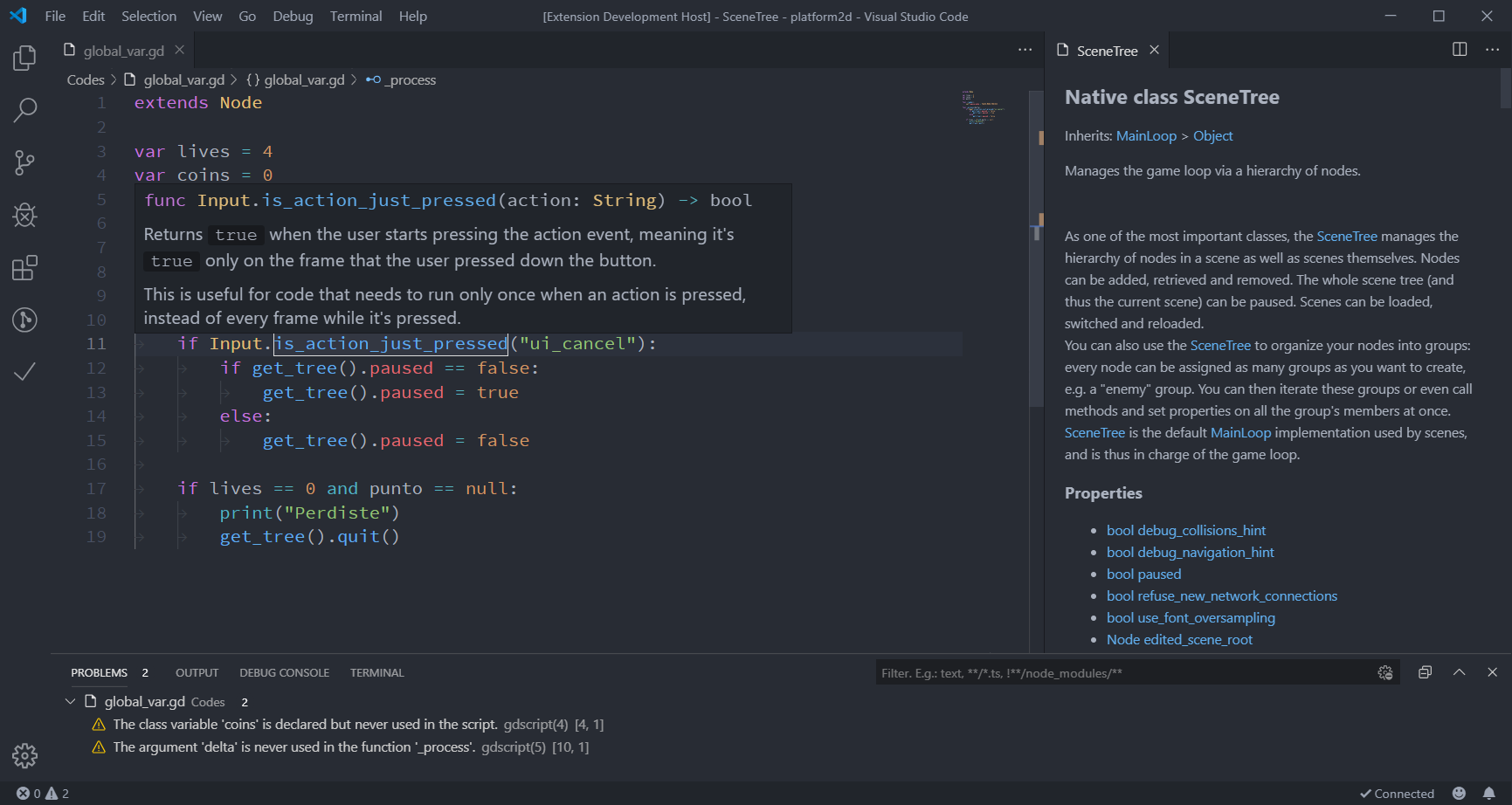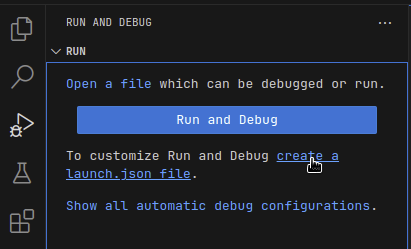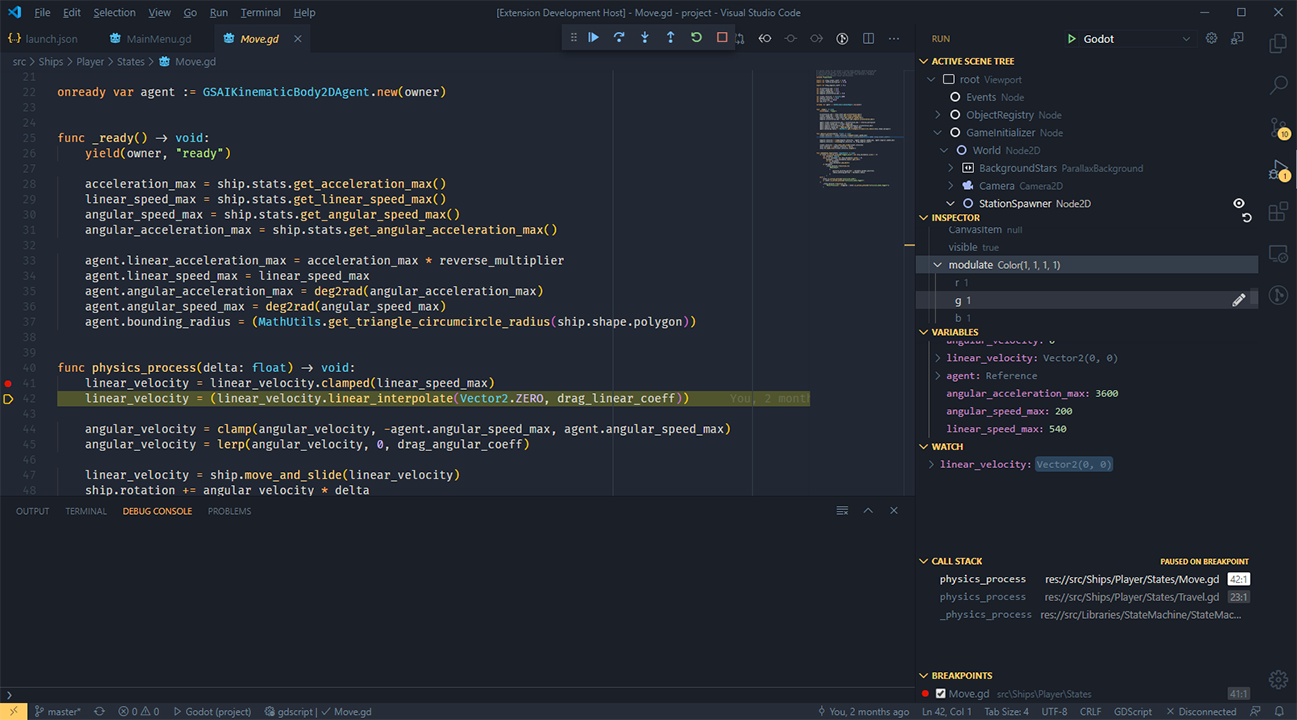A complete set of tools to code games with Godot Engine in Visual Studio Code.
IMPORTANT NOTE: Versions 1.0.0 and later of this extension only support Godot 3.2 or later.
The extension comes with a wealth of features to make your Godot programming experience as comfortable as possible:
- Syntax highlighting for the GDScript (
.gd) language - Syntax highlighting for the
.tscnand.tresscene formats - Syntax highlighting for the
.gdshadershader format - Full typed GDScript support
- Optional "Smart Mode" to improve productivity with dynamically typed scripts
- Function definitions and documentation display on hover (see image below)
- Rich autocompletion
- Switch from a
.gdfile to the related.tscnfile (default keybind isalt+o) - In-editor Scene Preview
- Display script warnings and errors
- Ctrl + click on a variable or method call to jump to its definition
- Full documentation of the Godot Engine's API supported (select Godot Tools: List native classes of Godot in the Command Palette)
- Run a Godot project from VS Code
- Debug your GDScript-based Godot project from VS Code with breakpoints, step-in/out/over, variable watch, call stack, and active scene tree
- Visual Studio Marketplace (recommended)
- Stable release, with support for automatic updates.
- GitHub Releases
- Stable release, but no automatic updates. Can be useful if you need to install an older version of the extension.
- Development build (follows the
masterbranch)- Development build. Contains new features and fixes not available in stable releases, but may be unstable.
- Extract the ZIP archive before installing (it contains the
.vsixfile inside).
To install from GitHub Releases or a development build, see Install from a VSIX in the Visual Studio Code documentation.
The extension adds a few entries to the VS Code Command Palette under "Godot Tools":
- Open workspace with Godot editor
- Run the workspace as a Godot project
- List Godot's native classes
If you like this extension, you can set VS Code as your default script editor for Godot by following these steps:
- Open the Editor Settings
- Select Text Editor > External
- Make sure the Use External Editor box is checked
- Fill Exec Path with the path to your VS Code executable
- On macOS, this executable is typically located at:
/Applications/Visual Studio Code.app/Contents/MacOS/Electron
- On macOS, this executable is typically located at:
- Fill Exec Flags with
{project} --goto {file}:{line}:{col}
You can use the following settings to configure Godot Tools:
godotTools.editorPath.godot3godotTools.editorPath.godot4
The path to the Godot editor executable. Under Mac OS, this is the executable inside of Godot.app.
godotTools.lsp.headless
When using Godot >3.6 or >4.2, Headless LSP mode is available. In Headless mode, the extension will attempt to launch a windowless instance of the Godot editor to use as its Language Server.
The debugger is for GDScript projects. To debug C# projects, use C# Tools for Godot.
To configure the GDScript debugger:
- Open the command palette (by pressing F1):
>View: Show Run and Debug- Click on "create a launch.json file"
- Select the Debug Godot configuration.
- Change any relevant settings.
- Press F5 to launch.
Required
None: seriously. This is valid debugging configuration:
{ "name": "Launch", "type": "godot" }Optional
project: Absolute path to a directory with a project.godot file. Defaults to the currently open VSCode workspace with ${workspaceFolder}.
port: The port number for the Godot remote debugger to use.
address: The IP address for the Godot remote debugger to use.
scene_file: Path to a scene file to run instead of the projects 'main scene'.
editor_path: Absolute path to the Godot executable to be used for this debug profile.
additional_options: Additional command line arguments.
Usage
- Stacktrace and variable dumps are the same as any regular debugger
- The active scene tree can be refreshed with the Refresh icon in the top right.
- Nodes can be brought to the fore in the Inspector by clicking the Eye icon next to nodes in the active scene tree, or Objects in the inspector.
- You can edit integers, floats, strings, and booleans within the inspector by clicking the pencil icon next to each.
The Godot Tools extension is an open source project from the Godot organization. Feel free to open issues and create pull requests anytime.
See the full changelog for the latest changes.
- Open a command prompt/terminal and browse to the location of this repository on your local filesystem.
- Download dependencies by using the command
npm install - When done, package a VSIX file by using the command
npm run package. - Install it by opening Visual Studio Code, opening the Extensions tab, clicking on the More actions (...) button in the top right, and choose Install from VSIX... and find the compiled VSIX file.
When developing for the extension, you can open this project in Visual Studio Code and debug the extension by using the Run Extension launch configuration instead of going through steps 3 and 4. It will launch a new instance of Visual Studio Code that has the extension running. You can then open a Godot project folder and debug the extension or GDScript debugger.
- Godot 3.2 or later is required.
- For Godot 4, the
gdscript_lsp_server_portsetting must be changed to6005to match the Godot editor's new default language server port number. - Make sure to open the project in the Godot editor first. If you opened the editor after opening VS Code, you can click the Retry button in the bottom-right corner in VS Code.
- GDScript is a dynamically typed script language. The language server can't infer all variable types.
- To increase the number of results displayed, open the Editor Settings, go to the Language Server section then check Enable Smart Resolve.


